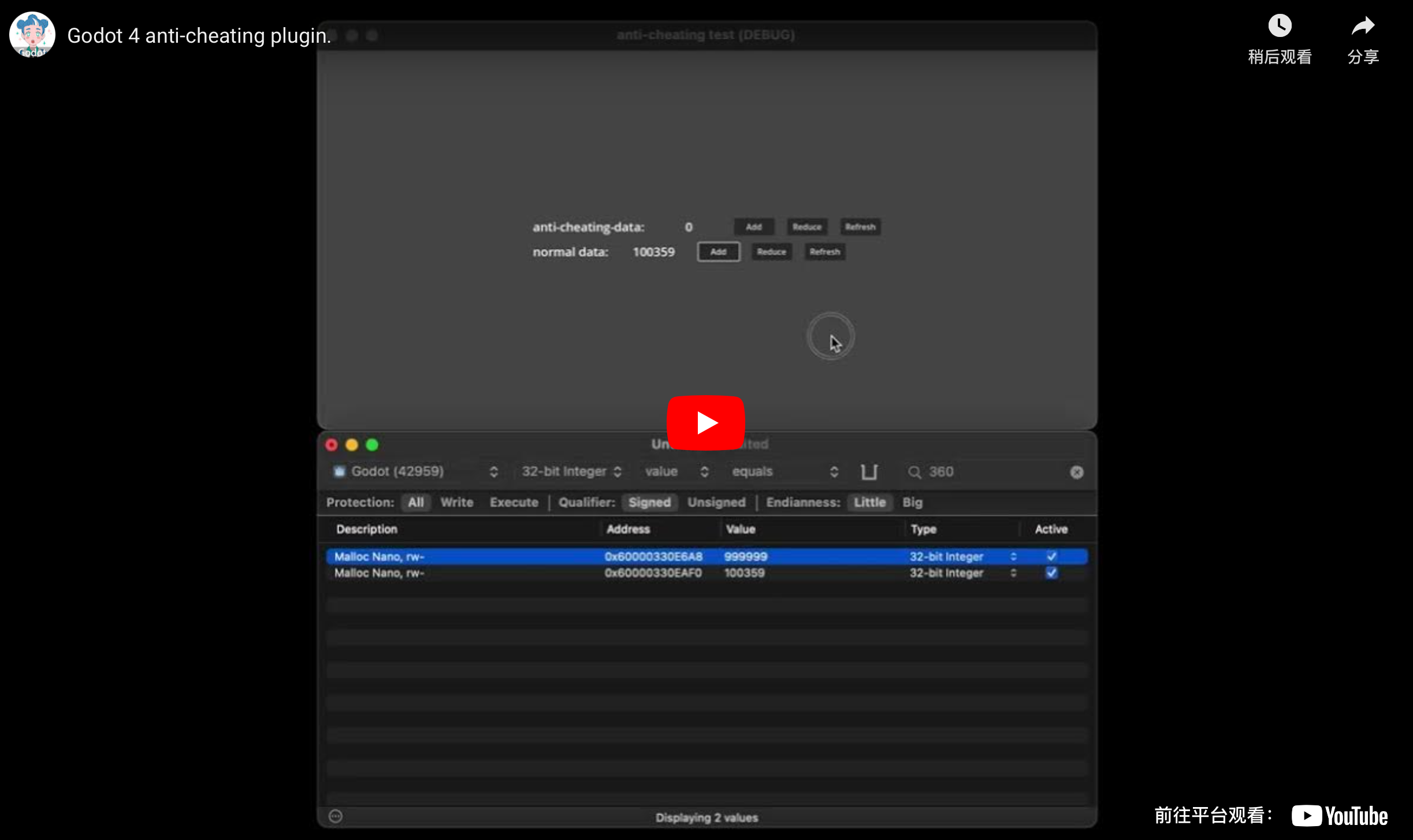Publisher
kokkoroshinzou
Anti-cheating-value-plus
Anti-cheating-value-plus is a plugin that prevents cheat tools from modifying sensitive data in the game memory. Now with support for string, bool, arrays, and dictionaries.
This plugin has been mirrored from the Godot Asset Library.
The plugin author is in no way affiliated with Gadget.
If you are the author of this plugin and would like this mirror removed, please contact support@gadgetgodot.com.
Anti-Cheat Value Plus Plugin
The Anti-Cheat Value Plus Plugin is designed to protect sensitive in-game data from being modified by cheat tools. It uses obfuscation techniques and runtime validation to secure data integrity.
Features
- Obfuscated Data Storage: Safeguards sensitive data by storing it in an obfuscated form.
- Runtime Validation: Ensures values remain unaltered during gameplay.
- Flexible Data Types: Supports multiple data types, including integers, floats, strings, arrays, dictionaries, and booleans.
How to Use
Step 1: Enable the Plugin
- Open your Godot project.
- Go to Project Settings > Plugins.
- Locate the Anti-Cheat Value Plus Plugin and enable it.
Step 2: Initialize the Anti-Cheat Pool
Before using the plugin, initialize the anti-cheat pool in your script:
var my_anticheat_pool: ac_node = acGlobalPool
The acGlobalPool acts as the central storage for all anti-cheat values.
Step 3: Set the disturb level of your pool:
my_anticheat_pool.disturb = 5
And now whenever a value is added to the pool, the appropriate amount of noise will be produced within to obfuscate it. These are automatically managed so if you change the value or erase it, the noise copies will follow suit.
Step 4: Create and Manage Anti-Cheat Values
The plugin provides specialized classes for different data types. Use these classes to create anti-cheat-protected variables:
ac_int: For integers.
ac_float: For floats.
ac_string: For strings.
ac_list: For arrays or dictionaries.
ac_bool: For booleans.
Example usage:
# Create a protected integer
var protected_int = ac_int.new(42)
# Add the protected integer to the global pool
my_anticheat_pool.set_value("my_protected_int", protected_int)
# Access the protected value
var value = my_anticheat_pool.get_value("my_protected_int").value()
print(value) # Outputs: 42
Step 5: Accessing and Modifying Values
Access and modify values using the set_value and get_value methods:
# Set a Value:
my_anticheat_pool.set_value("key_name", ac_value_instance)
# Get a Value:
var value = my_anticheat_pool.get_value("key_name").value()
Additional Feature: Assimilate
Easily merge your dictionaries into the pool with the assimilate method:
var dictionary = {"example1": "value1", "example2": 123, "example4": true}
my_anticheat_pool.assimilate(dictionary)
# This will now be an ac_string
var example1 = my_anticheat_pool.get_value("example1").value()
# Prints "value1"
print(example1)
ac_list Documentation
set_value(key, value)
Sets a value at the specified key in the Dictionary or at the specified index in the Array.
Updates the serialized internal state and notifies the parent of changes.
get_value(key, default_value)
Retrieves the value at the specified key (for Dictionary) or index (for Array).
If the key or index is not found, returns the default_value.
append(value)
Adds a new value to the end of the Array.
Throws an error if the internal structure is not an Array.
parse()
Returns the deserialized form of the internal data (either an Array or Dictionary).
remove_at(index)
Removes the element at the specified index in the Array.
Throws an error if the internal structure is not an Array.
erase(value)
Removes the first occurrence of the specified value in the Array or Dictionary.
If it's a Dictionary, it deletes the entry with the matching key.
Throws an error if the internal structure is unsupported.
duplicate()
Returns a new ac_list instance with a copy of the current data.
merge(value)
Merges the provided Dictionary into the current Dictionary.
Throws an error if the internal structure is not a Dictionary.
has(value)
Checks if the specified key (for Dictionary) or value (for Array) exists.
keys()
Returns all keys in the Dictionary.
Throws an error if the internal structure is an Array.
sort_custom(value)
Sorts the Array using a custom comparator function.
Throws an error if the internal structure is not an Array.
any(value)
Checks if any element in the Array satisfies the given callable condition.
Throws an error if the internal structure is a Dictionary.
is_empty()
Returns true if the internal Array or Dictionary is empty.
size()
Returns the number of elements in the Array or entries in the Dictionary.
Value Access
Values in an ac_list can be accessed using multiple methods:
By Method: get_value("key")
By Subscript: ["key"]
By Property Access: .key
These can be nested to mimic the structure of Array or Dictionary, allowing deep access into the data. For example:
var value = ac_list["key"]["nested_key"]
This class provides a secure and structured way to manage nested data while integrating with the anti-cheat system.
Performance Considerations
Using the Anti-Cheat Value Plugin introduces a small performance overhead due to its validation processes. Use it only for sensitive data to balance security and performance.
Additional Notes
The plugin supports both dictionaries and arrays as nested structures, stored and accessed through ac_list.
The acGlobalPool serves as a shared resource; initialize and use it consistently across your project.
The anti-cheat variables are accessed in the form of key-value pairs, so please ensure the uniqueness of the keys to avoid mistakenly overwriting the correct data.
Any JSON strings contained within an array or dictionary will be automatically parsed when retrieved from an ac_list.
NodePaths retrieved from an ac_list will be returned as they are instead of being wrapped in an ac_value.
